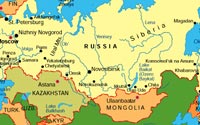 Multinational companies have begun to pay more attention to online consumers internationally, launching digital campaigns in China and now Russia.
Brands like Procter & Gamble continue to heighten demand for search engines and agencies to develop technology and services to support such campaigns. The transition could both help and put stress
on Russian search engines like Yandex.
Multinational companies have begun to pay more attention to online consumers internationally, launching digital campaigns in China and now Russia.
Brands like Procter & Gamble continue to heighten demand for search engines and agencies to develop technology and services to support such campaigns. The transition could both help and put stress
on Russian search engines like Yandex.
Yandex, Russia's top search engine, on Friday began rolling out a tool, Digital Eye, developed on its Crypta technology, giving exclusive rights to
Publicis' VivaKi to target online display ads based on the time consumed watching television.
"A search engine spokesperson said the companies
tested the technology with one of Vivaki's international clients. "
The ad targeting tool initially becomes available to clients of VivaKi group agencies in Russia, but Yandex plans to
expand the product for new partners. VivaKi, the holding company that develops tools and systems, oversees Publicis media shops such as Starcom MediaVest Group, ZenithOptimedia Group and
Digitas.
"Markets have different dynamics, but companies can carry many of the practices from country to country," said Douglas Clinton, research analyst at Piper Jaffray. "In the next
six to 12 months, I expect the pace of innovation to increase at Yandex. There is a market for U.S.-based advertisers in Russia."
Renault Nissan and Procter & Gamble were the top two online advertisers in Russia last year, according to TheRunet.com, a Web site providing insights into the Russian search and
ecommerce market. Advertising dollars in 2011 are estimated at around €1 billion. The site estimates display at 388.5 million Euros, and search at 639.1 million Euros. During the year, there were
57.8 million monthly and 44.3 million daily Internet users.
For several months during the testing period, Yandex used the same ad banner for all audience groups. The search engine found the
targeting system allows the engine to double the click-through rate of the ad campaign targeted to non-viewers or infrequent viewers of TV.
Yandex holds between 60% and 61% market share --
down from 65% in March 2011, according to Piper Jaffray. In April, the company reported Q1 2012 revenue of 5.87 billion rubles, up 51% year-on-year, which translates to $200 million. Google gained
some market share in Russia, reporting about 26% within the past week. Mail.ru holds about 8% share. Bing has some share, but "they are light years behind," Clinton said. "Bing's focus really remains
in the U.S."
GroupM estimated companies would spend in Russia about $835 million in 2010 on advertising. At the time, Piper Jaffray analysts estimated $2.5 billion by 2013.
Yandex
recently said Mozilla's Firefox browser dropped the company as the default engine, choosing Google -- but analysts don't expect it to have a meaningful impact on revenue and market share. Piper
Jaffray views the fact Yandex managed to overtake Google as the most-used search option in Chrome, which requires users to adjust settings, as a more impactful sign.